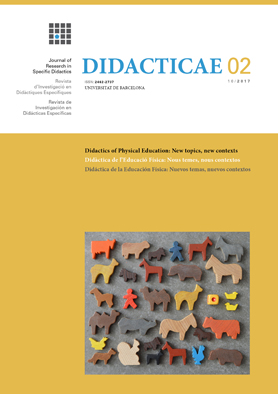Aprendizaje deportivo, inteligencia emocional y scratch. Posible transferencia a la Educación Física escolar
Sport, psychology and scratch: Possible transfer to school physical education
DOI:
https://doi.org/10.1344/did.2017.2.59-70Keywords:
piragüismo, software, inteligencia emocional, dureza mental.Abstract
This research, conducted as a pilot test, is about the perception of coaches in relation to the evolution of emotional intelligence, mental toughness and creativity of young students in their extracurricular sports activity through the process of designing and developing a game that simulates their sport, canoeing, using the Scratch free software. In order to do the activity, we use the pedagogical model of the Computer Clubhouse developed in the area of computing and that shows attractive challenges transferable to other areas of teaching and learning. Athletes, in order to overcome the challenge, must imagine situations, solve problems, manage their emotions and collaborate with their peers. All this generates a series of emotional processes that must be managed. The results show that the use of Scratch can signal a tendency to improve the canoeists’ psychological abilities and it is presented as an element of improvement applicable to school physical education.
References
Arribas-Galarraga, S., Saies, E., y Bustillo, J. (2016). El Modelo Computer Clubhouse en piragüistas de alto nivel. Tándem: Didáctica de la Educación Física, 53, 38-41.
Arruza Gabilondo, J. A., González Rodríguez, O., Palacios Moreno, M., Arribas-Galarraga, S., y Telletxea Artzamendi, S. (2013). Un modelo de medida de la inteligencia emocional percibida en contextos deportivo/competitivos. Revista de Psicología del Deporte, 22(2), 405-413.
Crombie, D., Lombard, C., y Noakes, T. (2009). Emotional intelligence scores predict team sports performance in a national cricket competition. International Journal of Sports Science and Coaching, 4(2), 209-224.
Hackfort, D., y Tenenbaum, G. (Ed) (2006). Essential processes for attaining peak performance. Perspectives of sport and exercise psychology, (Vol. 1). UK: Editorial Meyer&Meyer Sport.
Lacerda, T., y Mumford, S. (2010). The genius in art and in sport: A contribution to the investigation of aesthetics of sport. Journal of the Philosophy of Sport, 37(2), 182-193.
Lane, A. M., Thelwell, R. C., Lowther, J., y Devonport, T. J. (2009). Emotional intelligence andpsychological skills use among athletes. Social Behavior and Personality: An International Journal, 37(2), 195-201.
Loehr, J. E. (1986). Mental toughness training for sports: achieving athletic excellence. Lexington,MA: Stephen Greene Press.
López García, J. C. (2013). Identificación, expresión y regulación de emociones con Scratch. Recuperado de http://eduteka.icesi.edu.co/modulos/9/378/
Prensky, M. (2001). Digital natives, digital immigrants part 1. On the Horizon, 9(5), 1-6.
Resnick, M., y Rusk, N. (1996). The Computer Clubhouse: Preparing for life in a digital world. IBM Systems Journal, 35(3.4), 431-439.
Rusk, N., Resnick, M., y Cooke, S. (2009). Origins and Guiding Principles of the Computer Clubhouse. En Y. B. Kafai., K. A. Peppler & R. N. Chapman. (Ed.), The Computer Clubhouse: Constructionism and creativity in youth communities (pp. 17-25). New York: Teachers College Press.
Saies, E., Arribas-Galarraga, S., Cecchini, J. A., Luis-De-Cos, I., y Otaegi, O. (2014). Diferencias en orientación de meta, motivación autodeterminada, inteligencia emocional y satisfacción con los resultados deportivos entre piragüistas expertos y novatos. Cuadernos de Psicología del Deporte, 14(3), 21-30.
Salovey, P., y Mayer, J. D. (1990). Emotional intelligence. Imagination, cognition and personality, 9(3), 185-211.
Sheard, M. (2010). Mental toughness: The mindset behind sporting achievement. London: Routledge.
Downloads
Published
Issue
Section
License
Copyright (c) 2017 Didacticae: Journal of Research in Specific Didactics

This work is licensed under a Creative Commons Attribution-ShareAlike 4.0 International License.
The authors who publish in this journal agree to the following terms:
- Authors retain copyright and grant the journal the right of first publication.
- Submitting a paper does not involve paying any fees.
- Texts will be published under a Creative Commons Attribution Share-Alike 4.0 International License that allows others to share the work, provided they include an acknowledgement of the work’s authorship, its initial publication in this journal and the terms of the license.
- When citing works published in Didacticae, both the autor and the journal must be cited.
- Didacticae does not accept any responsibility for the points of view and statements made by the authors.



